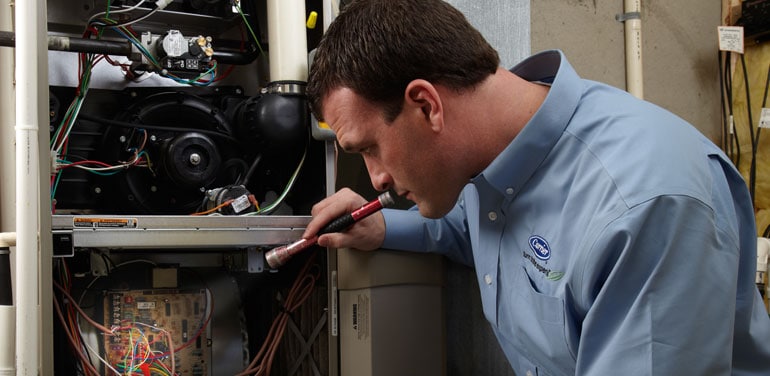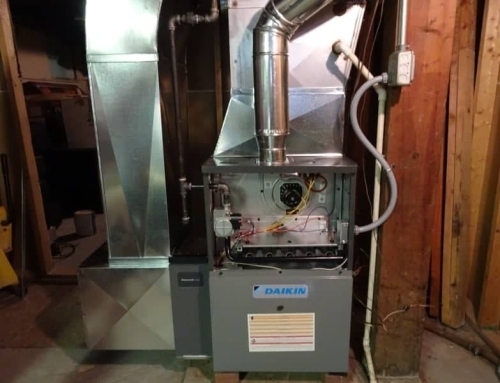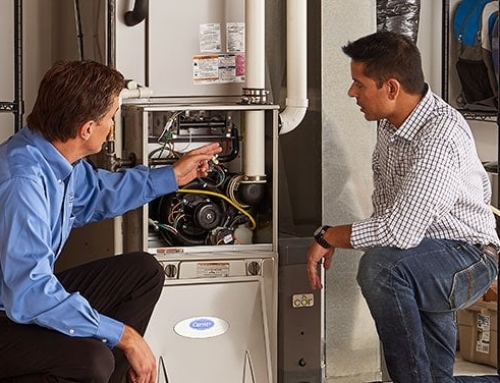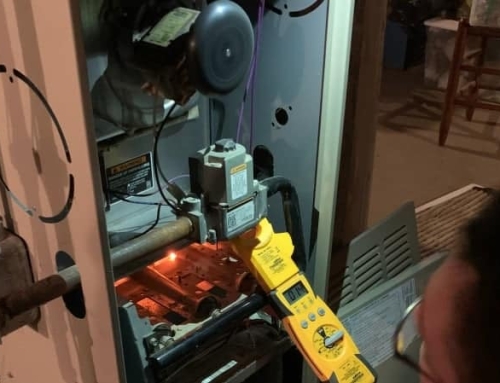It’s important to get regular tune-ups for your furnace. Learn the basics of what’s needed.
Many Wisconsin homeowners schedule an annual furnace tune-up to ensure their heating systems will run at maximum efficiency during the cold winter months. Operating a dirty furnace or boiler can cause future damage and shorten equipment life span by up to 10 years—not to mention running the risk of inconvenient, emergency breakdowns in the dead of winter.
Symptoms of a Dirty Furnace
If you’ve lived in your house a few years, you are probably familiar with the comfort levels your heating system normally provides. You should schedule a tune-up if you notice any of the following anomalies:
- Certain duct or heat registers don’t heat as efficiently
- Your gas bill is higher than normal
- Indoor air quality leads you to suspect that ductwork needs to be cleaned
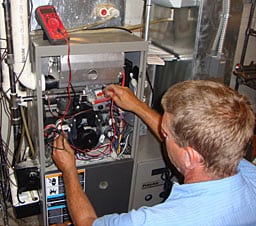 Even if you don’t notice any symptoms, you need to schedule a cleaning if your furnace is under factory warranty. Failure to do so may result in forfeiting that warranty.
Even if you don’t notice any symptoms, you need to schedule a cleaning if your furnace is under factory warranty. Failure to do so may result in forfeiting that warranty.
Tune-Up Tasks
The older the furnace, the more important it is to get it checked every year because older systems lack a device that shuts down the furnace if there is a hazardous condition such as a carbon monoxide crack.
A typical furnace tune-up and professional cleaning includes:
- Inspection/cleaning the furnace heat exchanger. To ensure proper fuel combustion and heat transfer, the heat exchanger is cleaned and inspected for holes or cracks. Hazardous carbon monoxide could escape into your home if this situation exists.
- Checking the furnace blower motor/wheel. Just like the engine on your automobile, some furnace motors and bearings need periodic lubrication and cleaning to reduce wear and tear.
- Lubricating all moving parts. Your heating system will run smoothly and without problems with regular lubrication.
- Tightening wire connections. Making sure that all electrical connections to and from the furnace are secure will ensure safety and protect against early failure.
- Inspecting chimney/flue. Checking the condition of the flue or chimney will help protect against obstructions, corrosion, and improper drafting.
- Replacing air filters. Dirty filters make the furnace work harder by preventing a free flow of air. Installing fresh filters will improve air flow, increase efficiency, heating comfort, and keep your heating system running longer.
- Check for fire hazards. Combustible material—paint cans, newspapers, cleaning solvents—stored too close to the furnace is a fire hazard. Those items should be discarded or moved to a safer location.
- Testing the thermostat. Calibrating the thermostat to ensure the correct amount of heat from the furnace helps to increase your comfort, keep the equipment functioning correctly, and maybe even lower your utility bill. You may consider having a programmable thermostat installed. Its purpose is to establish settings that automatically reduce heating in your home when you don’t need as much. Ask your HVAC contractor about whether a programmable thermostat is right for your home.
Seal Your Ductwork
Although not part of a furnace tune-up, a duct system that has leaks, holes or poorly connected ducts can cause about 20 percent heat loss. The ultimate result is difficulty in keeping the house comfortable, no matter how the thermostat is set. Homeowners can take on duct repair as a do-it-yourself project or work with a contractor to repair areas not easily accessible. Checking and repairing leaky ducts not only improves comfort and air flow distribution—it reduces the risk of asthma and allergy problems by improving indoor air quality.
The importance of a fall furnace tune-up cannot be underestimated. In addition to providing a homeowner improved heating efficiency, safety, and indoor comfort, a regular furnace tune-up can spell the difference between a five- to 10-year life expectancy and a 15- to 20-year life expectancy for your heating system.
Any way you look at it, one ounce of timely prevention is worth a pound of emergency cure.
 Skip to content
Skip to content

